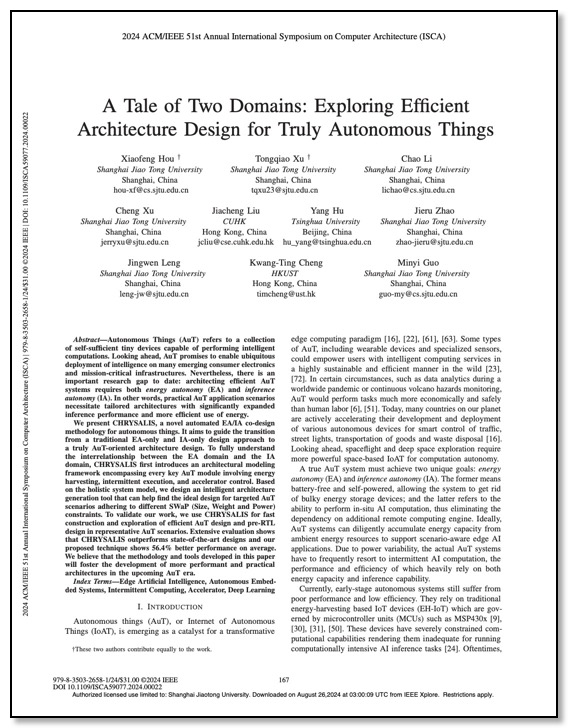Xiaofeng Hou, Tongqiao Xu, Chao Li, Cheng Xu, Jiacheng Liu, Yang Hu, Jieru Zhao, Jingwen Leng, Kwang-Ting Cheng, Minyi Guo
In Proceedings of International Symposium on Computer Architecture (ISCA), 2024
ABSTRACT
Autonomous Things (AuT) refers to a collection of self-sufficient tiny devices capable of performing intelligent computations. Looking ahead, AuT promises to enable ubiquitous deployment of intelligence on many emerging consumer electronics and mission-critical infrastructures. Nevertheless, there is an important research gap to date: architecting efficient AuT systems requires both energy autonomy (EA) and inference autonomy (IA). In other words, practical AuT application scenarios necessitate tailored architectures with significantly expanded inference performance and more efficient use of energy.
We present CHRYSALIS, a novel automated EA/IA co-design methodology for autonomous things. It aims to guide the transition from a traditional EA-only and IA-only design approach to a truly AuT-oriented architecture design. To fully understand the interrelationship between the EA domain and the IA domain, CHRYSALIS first introduces an architectural modeling framework encompassing every key AuT module involving energy harvesting, intermittent execution, and accelerator control. Based on the holistic system model, we design an intelligent architecture generation tool that can help find the ideal design for targeted AuT scenarios adhering to different SWaP (Size, Weight and Power) constraints. To validate our work, we use CHRYSALIS for fast construction and exploration of efficient AuT design and pre-RTL design in representative AuT scenarios. Extensive evaluation shows that CHRYSALIS outperforms state-of-the-art designs and our proposed technique shows 56.4% better performance on average. We believe that the methodology and tools developed in this paper will foster the development of more performant and practical architectures in the upcoming AuT era.
